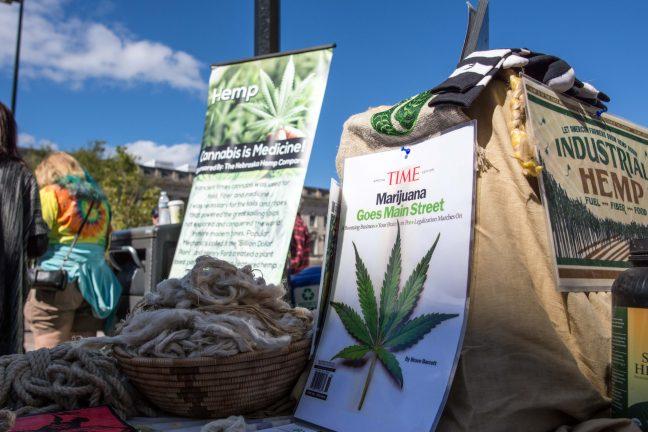Wisconsin, the isolated island locked between three states that have legalized marijuana in one form or another, might not be so isolated anymore.
According to Wisconsin Public Radio, a new bill, proposed Oct. 30 by Democratic state lawmakers, would decriminalize amounts of marijuana under 28 grams.
This is a big deal for a variety of reasons, the biggest one being that marijuana is considered to be a harmful drug.
In reality, this drug is harmful in ways more social than chemical, and paradoxically, legalizing it could mitigate these harms.
Wisconsin sits between Minnesota, which legalized medical marijuana in 2014, Michigan, which legalized both medical and recreational marijuana in 2018, and Illinois, which also legalized both forms just this year.
Now the questions remain: why did Wisconsin wait to legalize marijuana, and who could benefit if it didn’t wait any longer?
One of the reasons why Wisconsin hasn’t legalized marijuana yet is because of conservative anti-marijuana lawmakers.
Republicans control the House of Representatives in Wisconsin, which means they also control which bills reach Gov. Tony Evers’ desk. This severely impedes legalization progress.
Marijuana legalization inevitable but will bring new economic, social challenges
Also, according to the Milwaukee Journal Sentinel, there are many push factors to legalize weed, but those factors don’t apply to Wisconsin. There’s not a marijuana-tolerant House, there’s no ballot measure to give the decision to the people (though a November 2018 referendum revealed that most Wisconsin voters approved of medical and recreational legalization), and there’s no pressure from the economy to acquire extra help from legal-weed-sale taxes. There’s just no excuse to have it.
But the horizon is shifting and there might be hope for partial marijuana decriminalization as a compromise. Why do I call it hope? Well, let’s shift point of views.
Right now, black individuals are arrested for marijuana possession at four times the rate of white people in Wisconsin.
This presents a giant institutional problem. The truth is, the illegality of marijuana feeds systemic racism. It does this by perpetuating disproportionate mass incarceration rates of people of color, especially black folks.
This argument isn’t new, but it gets brushed off or disputed constantly. We should set the record straight.
First, let’s review mandatory minimums.
In the height of the War on Drugs in the 1980s, mandatory minimums — not a new invention — started to have detrimental effects. These uniform penalties forced a person caught with possession into a prescribed prison sentence with no exceptions. They sent thousands of people to prison for five or 10 years, or even life.
Alone, mandatory minimums are just annoying standards. Except they never affected everyone equally. These outrageously harsh, extremely harmful punishments ended up hitting black people the most.
The reason why it’s important to consider mandatory minimums in the 80s is because once the legal system got in the habit of creating this disparity, it never stopped.
Medical marijuana bill to potentially bring medical, monetary benefit, affect arrests
Nationally, black people are still arrested at more than five times the rate of white people.
The Stanford Open Policing Project, a 2015 study, tracked police stops and police outcomes. The study found police still target people of color more than they target white people.
On a more local scope, the statistics support this. Black Wisconsinites make up about 6.7% of Wisconsin’s population, but around 42% of prison inmates in Wisconsin are black.
This is a seriously disproportionate amount of people of one race going to prison. It proves that the United States’ habit of sending black individuals to jail just to keep them there for an unmovable, inflexible amount of time never went away after the 1980s.
Smoke Signals: Wisconsin referendum reveals voters want legal weed, but what are the risks?
So how does this connect back to a simple marijuana law?
Well, we’ve already discussed black people are more likely to be arrested. And right now, state law says possession for any amount yields up to six months in prison and a fine of $1,000. Any offense after that leads to three and a half years in jail and a fine of up to $10,000.
If a small amount of weed was decriminalized, the state mandatory minimum sentence would do a lot less damage. Its wide net would only trap people with 28 grams or more, which would exclude the considerable amount of offenders who are convicted for only a small quantity of marijuana.
Currently, people of color are being targeted and thrown in jail over petty possession, but what if petty possession becomes legal? Then the rug is pulled out from under the problem, and it relieves the strain put on minorities.
Allowing the existence of an infamous drug is hard, and it can be uncomfortable to think about. But I encourage everyone to look at it with compassion, rationale and dignity. Sometimes the crazy things just might work.
Katie Hardie ([email protected]) is a freshman studying nursing.





















